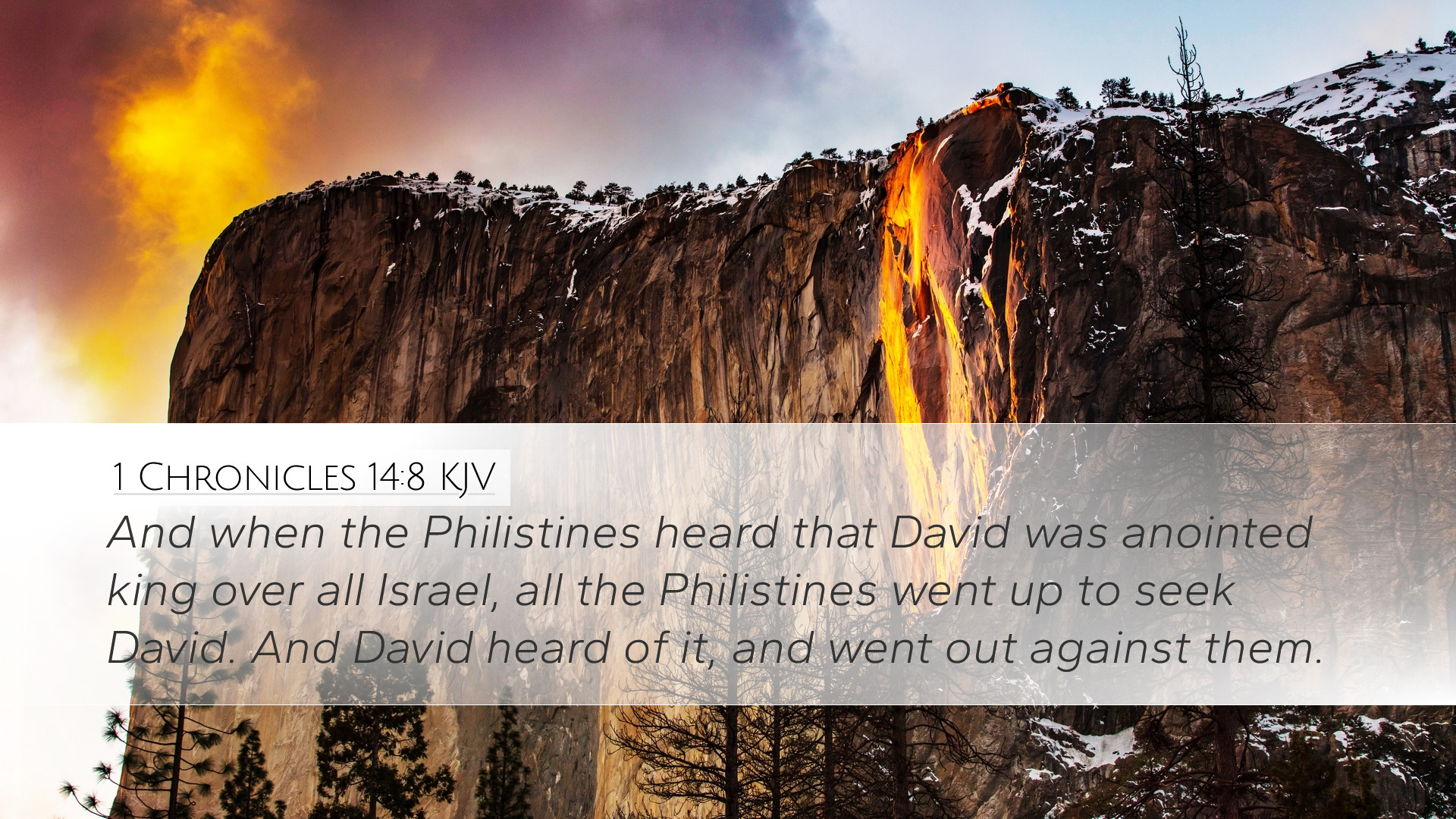Bible Commentary on 1 Chronicles 14:8
Verse Context and Translation:
1 Chronicles 14:8 states, "When the Philistines heard that David had been anointed king over all Israel, they went up to search for David; but David heard of it and went out against them." This verse is pivotal in understanding the dynamics of David's reign and the persistent conflict with the Philistines.
Introduction
This verse reflects the ongoing tensions between David's newly established kingdom and the Philistine threat. It showcases the immediate reaction of the Philistines to David's anointment, emphasizing their longstanding animosity and desire to undermine his authority.
Commentary Insights
Historical Setting and Significance
Matthew Henry notes that David's anointing was not just a personal elevation but a significant moment for Israel's national identity. The Philistines, recognizing that David was now king, viewed him as an adversary to their oppressive reign over the Israelites. For David, this was a moment to demonstrate his leadership and reliance on God.
Philistines’ Response
Albert Barnes points out that the Philistines’ action in seeking out David illustrates a fierce loyalty to their ancient enmity against Israel. The Philistines intended to nip David’s kingship in the bud, perceiving him as a significant threat to their power. Their proactive search signifies the magnitude of David's ascendancy.
David’s Reaction
Adam Clarke emphasizes David's immediate response to the threat. Rather than retreating in fear or waiting for the Philistines to act, David took the initiative to confront them. This decision reflects not only his courage but also his understanding of the need for decisive action in leadership.
Theological Implications
This verse opens a discussion on the nature of divine appointment versus earthly opposition. David's anointing as king symbolized God’s choice, yet that choice was met with hostility. Theological reflections here invite the reader to consider how God's plans are often met with resistance and the call for leaders to remain steadfast in their faith.
God’s Sovereignty
The overarching theme within this passage reveals the sovereignty of God in the face of human conflict. Matthew Henry articulates that David’s recognition of the threat from the Philistines and his immediate action underscores the divine promise that God’s anointed will prevail, despite adversity.
Responsibility and Leadership
Clarke notes the importance of a leader’s responsibility to God and their people. David’s proactive stance provides a model for leaders today who must be both vigilant and resilient in the face of threats. Relying on God's strength while taking appropriate action serves as a vital lesson.
Practical Applications
This verse offers rich lessons for pastors, students, and scholars alike. It serves as a reminder of the necessity for vigilance in leadership and the importance of establishing a deep reliance on God amidst challenges.
- Faithfulness in Leadership: Leaders must remain committed to their calling and trust in God’s promises, even when faced with opposition.
- Active Engagement: Just as David went out to confront his enemies, leaders should take initiative rather than passively waiting for challenges to resolve themselves.
- Understanding Spiritual Warfare: Every believer is called to recognize the spiritual realities behind physical conflicts and confront them through prayer and faith.
Conclusion
In summary, 1 Chronicles 14:8 is a crucial verse that encapsulates the challenges of leadership under divine appointment. The immediate response of both David and the Philistines sets the stage for the subsequent events of David’s reign. As pastors and students study this passage, they are encouraged to reflect on the dynamics of their own call to leadership in the face of opposition, continually trusting in God's guidance and power.


